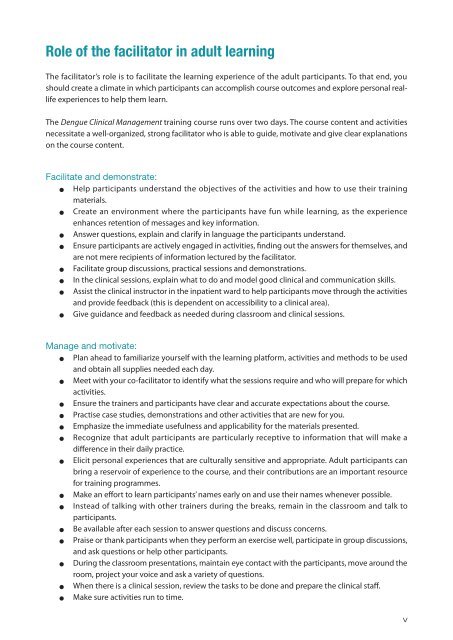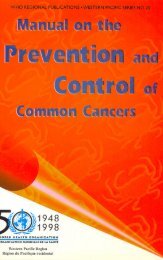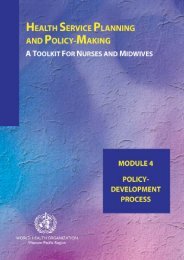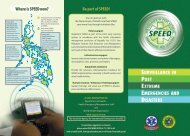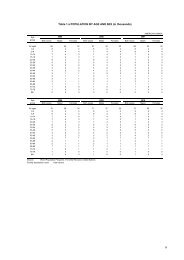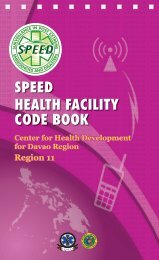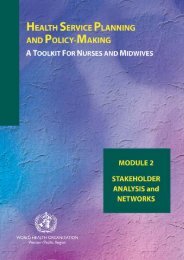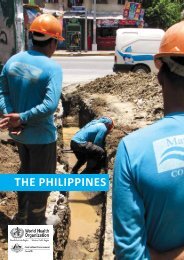Facilitator - WHO Western Pacific Region - World Health Organization
Facilitator - WHO Western Pacific Region - World Health Organization
Facilitator - WHO Western Pacific Region - World Health Organization
You also want an ePaper? Increase the reach of your titles
YUMPU automatically turns print PDFs into web optimized ePapers that Google loves.
Role of the facilitator in adult learning<br />
The facilitator’s role is to facilitate the learning experience of the adult participants. To that end, you<br />
should create a climate in which participants can accomplish course outcomes and explore personal reallife<br />
experiences to help them learn.<br />
The Dengue Clinical Management training course runs over two days. The course content and activities<br />
necessitate a well-organized, strong facilitator who is able to guide, motivate and give clear explanations<br />
on the course content.<br />
Facilitate and demonstrate:<br />
OO<br />
Help participants understand the objectives of the activities and how to use their training<br />
materials.<br />
OO<br />
Create an environment where the participants have fun while learning, as the experience<br />
enhances retention of messages and key information.<br />
OO<br />
Answer questions, explain and clarify in language the participants understand.<br />
OO<br />
Ensure participants are actively engaged in activities, finding out the answers for themselves, and<br />
are not mere recipients of information lectured by the facilitator.<br />
OO<br />
Facilitate group discussions, practical sessions and demonstrations.<br />
OO<br />
In the clinical sessions, explain what to do and model good clinical and communication skills.<br />
OO<br />
Assist the clinical instructor in the inpatient ward to help participants move through the activities<br />
and provide feedback (this is dependent on accessibility to a clinical area).<br />
OO<br />
Give guidance and feedback as needed during classroom and clinical sessions.<br />
Manage and motivate:<br />
OO<br />
Plan ahead to familiarize yourself with the learning platform, activities and methods to be used<br />
and obtain all supplies needed each day.<br />
OO<br />
Meet with your co-facilitator to identify what the sessions require and who will prepare for which<br />
activities.<br />
OO<br />
Ensure the trainers and participants have clear and accurate expectations about the course.<br />
OO<br />
Practise case studies, demonstrations and other activities that are new for you.<br />
OO<br />
Emphasize the immediate usefulness and applicability for the materials presented.<br />
OO<br />
Recognize that adult participants are particularly receptive to information that will make a<br />
difference in their daily practice.<br />
OO<br />
Elicit personal experiences that are culturally sensitive and appropriate. Adult participants can<br />
bring a reservoir of experience to the course, and their contributions are an important resource<br />
for training programmes.<br />
OO<br />
OO<br />
OO<br />
OO<br />
OO<br />
OO<br />
OO<br />
Make an effort to learn participants’ names early on and use their names whenever possible.<br />
Instead of talking with other trainers during the breaks, remain in the classroom and talk to<br />
participants.<br />
Be available after each session to answer questions and discuss concerns.<br />
Praise or thank participants when they perform an exercise well, participate in group discussions,<br />
and ask questions or help other participants.<br />
During the classroom presentations, maintain eye contact with the participants, move around the<br />
room, project your voice and ask a variety of questions.<br />
When there is a clinical session, review the tasks to be done and prepare the clinical staff.<br />
Make sure activities run to time.<br />
v


